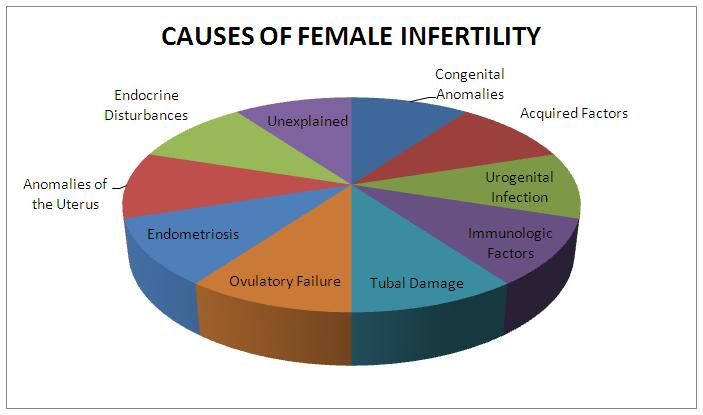Infertility can involve complex reproductive health issues that make it difficult for women to conceive. Fertility specialists use blood tests and imaging technology to help such women understand the cause of their infertility. When standard tests fail to identify reasons why a woman is experiencing conception challenges, an unexplained infertility diagnosis may be given. Here are several factors that can cause unexplained infertility:
Inflammatory Diseases
Inflammation of the organs around the pelvic area may affect a woman’s chances of conceiving naturally. Pelvic inflammatory disease (PID) is an infection of the female reproductive organs, often caused by sexually transmitted infections like gonorrhea and chlamydia. PID can cause damage to the fallopian tubes and lead to scar tissue formation, hindering egg travel to the uterus during ovulation. Endometriosis can also cause inflammation in the uterine lining, affecting implantation. A fertility specialist can help diagnose unexplained infertility and explore treatment options like laparoscopy to remove scar tissue.
Hormonal Imbalances
Hormones like follicle-stimulating hormone, progesterone, and estrogen facilitate reproduction. Hormonal imbalances can disrupt reproductive system processes, leading to difficulties getting pregnant. Conditions like polycystic ovary syndrome (PCOS) and thyroid disorders can cause irregular menstrual cycles. Hormonal imbalances may also cause endometrial tissue to grow outside the uterus, leading to fertility issues. Fertility specialists can conduct further testing to verify hormonal imbalances and check for genetic markers that may identify causes of infertility. They may also prescribe hormone therapy and medications to regulate hormones.
Age
Fertility naturally declines as women age, which can cause them to experience challenges with conceiving. Women nearing menopause may experience irregular ovulation and unpredictable menstrual cycles, making it harder to time conception correctly. A diminishing ovarian reserve and lower egg quality can also reduce the chances of successful conceptions. Older eggs may also be more likely to have chromosomal abnormalities that can lead to congenital disabilities or miscarriages.
Lifestyle Factors
Unhealthy lifestyle choices can affect a woman’s reproductive health. Activities like smoking, excessive alcohol consumption, and drug use can cause fertility issues. Obesity or being significantly underweight can cause hormonal imbalances and insulin resistance, affecting fertility. Environmental toxins may also disrupt endocrine production, influencing reproductive health. Fertility specialists may recommend lifestyle changes like a healthy diet to help improve a woman’s chances of conception. Regular physical activity can help maintain a healthy weight, potentially improving reproductive health and overall well-being.
Genetic Factors
Inherited gene variations and mutations affecting reproductive system functions can cause infertility. Chromosomal abnormalities like Turner syndrome can lead to ovarian dysfunction and infertility. PCOS may also have genetic components, leading to irregular ovulation. Premature ovarian insufficiency can contribute to early-onset menopause, causing infertility in younger women. Fertility doctors can diagnose genetic factors through targeted testing and recommend genetic counseling to discuss potential risks. They can also address other options like assisted reproductive technologies to help with conception.
Immunological Factors
Autoimmune disorders like lupus can cause the immune system to attack its own reproductive cells. Such disorders may disrupt fertilization and reduce the chances of successful conception. Immunological factors can also be more complicated and may not cause infertility directly, so individuals will likely need an expert diagnosis from a fertility specialist. A specialist can conduct blood tests and recommend treatment options like immunosuppressive medications.
Understanding Unexplained Infertility
Infertility can be a result of a single reproductive issue or a combination of different complex issues. It can involve factors like inflammation, hormones, genes, age, and lifestyle choices. Fertility specialists may utilize blood, imaging, and genetic testing to work towards uncovering the root cause of unexplained infertility. Ask a fertility doctor about alternative testing options today to help explore possible causes of infertility.
